AI is not “responsible.”
It’s also not empathetic. Or ethical. Or idealistic.
Those aren’t criticisms. How could it be any of those things? AI is still in its adolescence.
Not to sound like a Luddite, but there are nuances of the human condition, of social science in general, that AI may never fully grasp. Not to sound like an alarmist, but I don’t think we ever want it to. Feelings are what make us uniquely human.
In the absence of feelings, algorithms seek the most efficient and resolute means of achieving their objectives (look up “The Paper Clip Problem”). If those objectives are to engage or persuade people, machines will hone in on our weakest vulnerabilities – our fascination for sensationalism, for controversy, for disaster. Machines won’t comprehend why…or the damage.
Saying AI is responsible for its many misgivings – from its silly gaffes to its more egregious breaches of ethics – is like saying the car is responsible when a distracted driver runs into a telephone pole. The safety of a car depends on the humans who design, build, operate, and inspect it. So, too, with AI.
There are two ways to solve for this responsibility problem. The easiest but least automated or efficient is for morally vigilant humans to scrutinize the outputs of AI before they go live.
The second is to build guard rails around the inputs or prompts the algos can use. This holds the promise of pure automation but also the greatest risk of oversight or unintended consequences.
We see the consequential pitfalls of input controls in ad targeting. The industry has made blunt moves in recent years away from pinpointing people based on things like race, income, or sexual orientation – for good reason. Excluding certain groups or preying on them based on an obtuse stereotype often perpetrates some form of “ism” or another.
The downside, however, is that many products – say, new medical treatments – are uniquely beneficial, even critical, to one group over others. Without the ability to target these groups, advertisers are relegated to broadcast, hoping the right audience just happens along. Given many of these groups are a small percentage of the population, the odds of catch-as-catch-can are low for the consumer-in-need and advertiser alike.
How can we expect AI – today or ever – to understand the nuances of humanity or privacy or political correctness? As I often learn clumsily from my kids, the standards are changing almost by the day. True emotional intelligence might never be artificial.
In the end, I believe only humanity can truly understand humanity – to decide between right and wrong in the moment. I’m sure the most bullish AI advocates will disagree.
I hope they’re wrong.
Here’s what we’re seeing:
Consumer confidence had a nice rally since I last wrote. This happened before Thanksgiving, but it deserves top billing, nonetheless. Our Economic Sentiment Index reached its highest point since mid-August, driven by a huge 5+ point increase in optimism for the broader U.S. economy. Confidence in the housing market was the only indicator that fell. This week’s banner GDP numbers and last week’s CPI report all gelled with the narrative. If the Fed indeed lands this plane softly, someone deserves a parade.
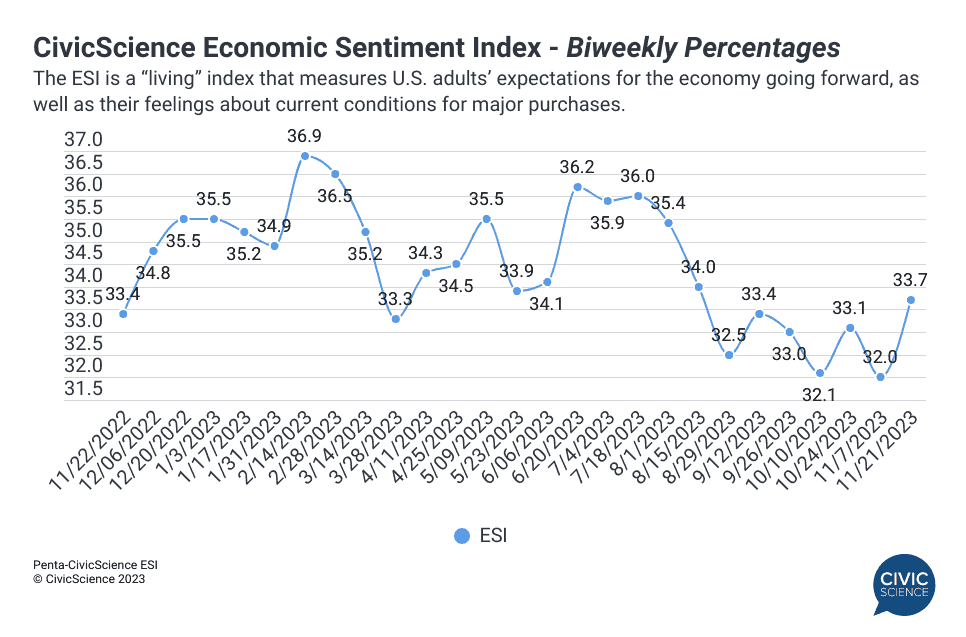
Outlook aside, Americans are feeling real-time financial strains when it comes to healthcare. In our 3 Things to Know this week, we learned that a troubling 27% of U.S. adults say they were unable to make a doctor visit in the past year because of cost. People who say they’ve missed payment on a medical bill in the last 90 days are up 20% from the same period last year. In other news, we looked into consumer interest in “Travel Tuesday” (new to me). Finally, we found that a not-insignificant 45% of adults say they’d be at least somewhat willing to support a third-party presidential candidate if the alternatives were Joe Biden and Donald Trump.
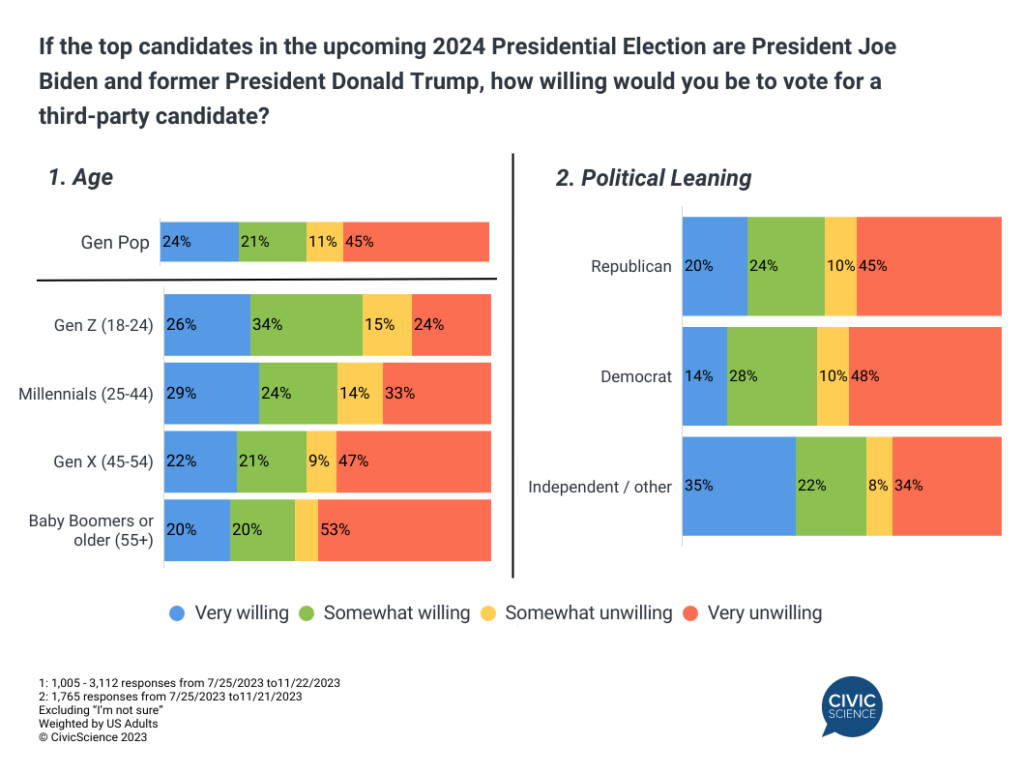
Remember this for next year: Hispanic Americans lead the way in holiday retail. We did a little dive into the holiday shopping habits of U.S. Hispanics and uncovered some fascinating findings. First, they were way more likely than non-Hispanics to have started their buying much earlier in the season. Second, they significantly over-index as saying they expect to spend more and buy more gifts than they did last year. On the flip side, they’re twice as likely as non-Hispanics to use buy now, pay later options to make it work.
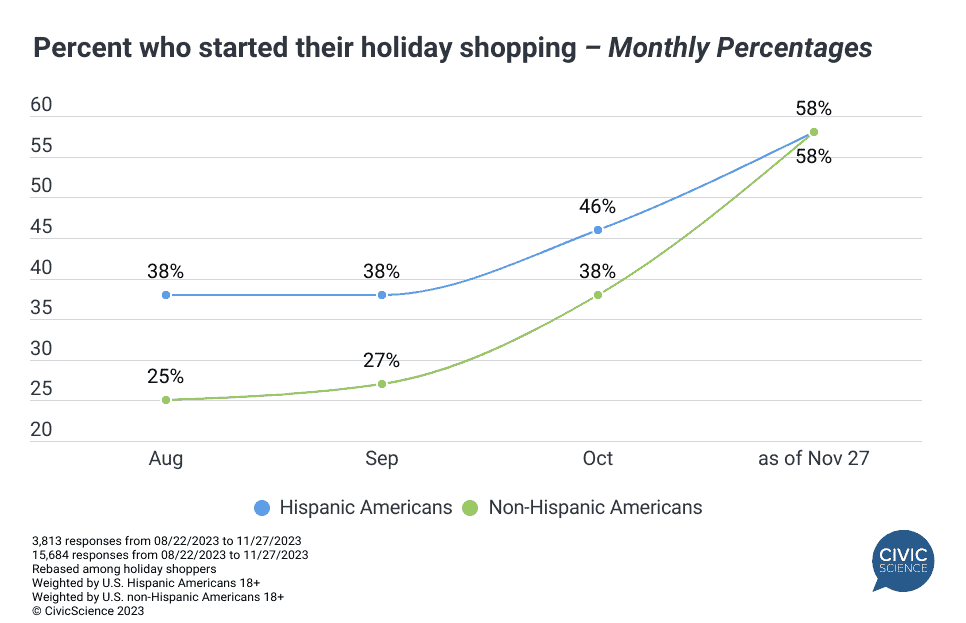
Organic food has been resilient throughout our economic rollercoaster. Yet another data point about the role of emotional well-being in consumer value judgments, the percentage of Americans who buy organic food has continued to climb over the past year. The trend crosses financial lines, with even lower-income groups showing increased organic usage. We’ve seen confirming trends in areas like specialty meats and salts this year. It tells us that for consumers who value eating healthy, clean, or being a “foodie,” maintaining spending in these categories remains a priority while they trade down elsewhere to make it work.
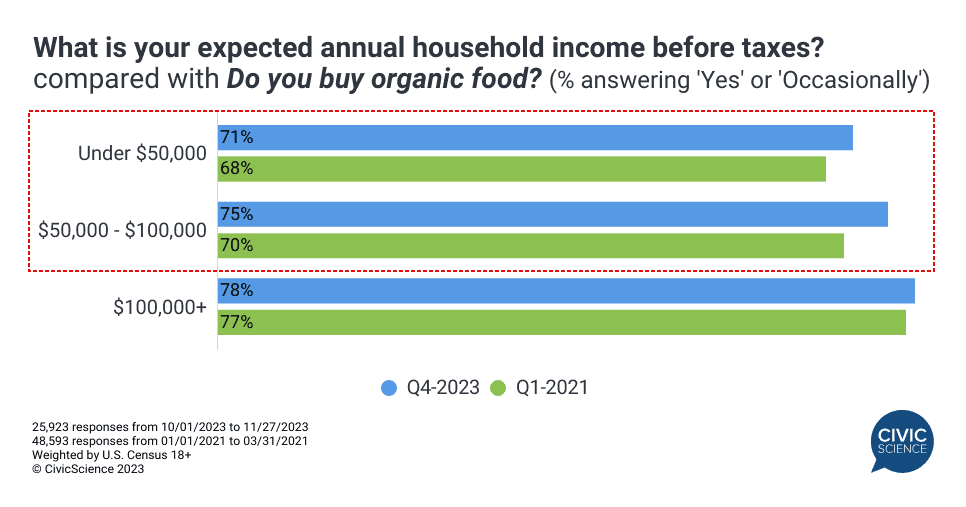
Pandemic pet parents are way different from seasoned veterans. Quarantine was the ideal condition for a surge in new pet ownership…the isolation, boredom, and time at home to train them. It also created an entirely new generation of pet owners – mostly younger ones – who didn’t appreciate the challenges of having a pet when life was more normal. Going to work, traveling, or even leaving the house at all can be complicated when a living thing in your house needs to eat and go to the bathroom a couple of times a day. Anyway, we looked at one dimension of this new pet owner generation – travel – and found that pandemic pet owners are much more likely to travel, half as likely as pre-pandemic owners to travel with their pets, and 4 times more likely to board them this holiday season. Pets are a big commitment.
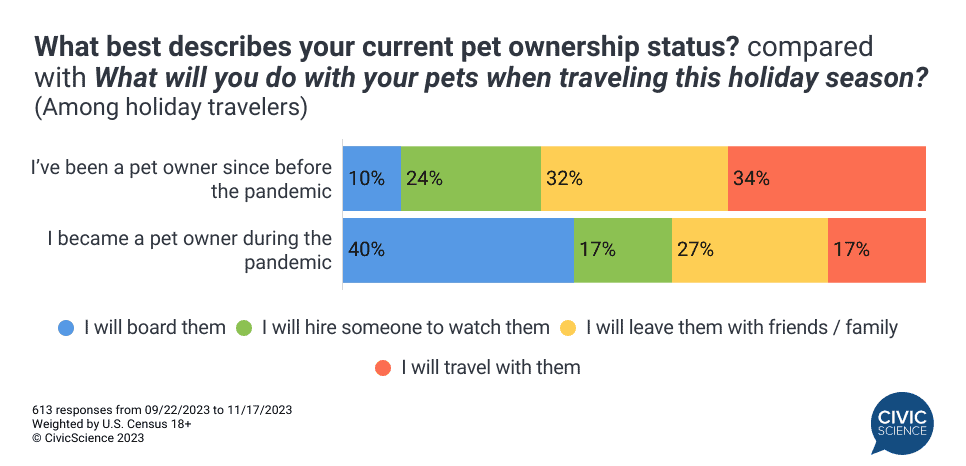
Here’s a two-week backlog of InsightStore™ awesomeness to share:
- In last week’s 3 Things to Know, we looked at how urban dwellers were more likely to travel for the holiday, how more people planned to talk politics at the Thanksgiving table, and in-store Black Friday shoppers;
- Parents are way more stressed than non-parents during the holiday season;
- Expected participation in Giving Tuesday was up this year;
- We otherwise profiled a ton of different brand and category consumers:
And these were our most popular questions:
How would you rank Dolly Parton among all active singers?
Do you think Taylor Swift and Travis Kelce make a good couple?
Would you participate in a show like ‘The Masked Singer’ if given the opportunity?
How many days per week, on average, do you use Spotify?
On average, how many nights a week do you eat dessert after dinner?
Would you eat a live beetle if someone dared you to do so?
Answer Key: The Queen; Sure; Absolutely; Never – I use Amazon and Apple Music; Also never; Only if I lost a bet.
Hoping you’re well.
JD








